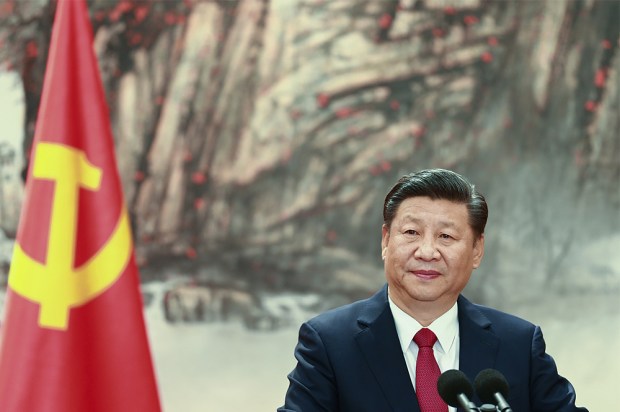MS Queen Victoria, 38°N 19°E
I’ll do my best, but I’ve got to be honest: being surrounded by shining Ionian waters and convivial Spectator cruisers isn’t helping me channel the panic that has gripped global markets. So forgive me if this dispatch doesn’t have the apocalyptic tone you’re expecting. I’m as irritated as anyone that contagion from China’s share-gambling epidemic has knocked my modest interest in FTSE100 stocks back to where it stood in late 2012, but ask yourself: do you know anything about China or the global economy today that you didn’t know a month ago?
Markets have overreacted, on relatively thin mid-August trading volumes, to a long-anticipated slowdown of Chinese industrial and consumer activity for which the collapse of the crazy Shanghai share boom, and ineffectual state attempts to stem the tide, have been taken as an alarm siren.
Added to this is the fear that official interest rates must rise again soon. But we’ve known that for ages, too — and market turmoil may well be a reason for the US Fed to defer a rate hike (which may or may not have been imminent) for six months, especially since oil prices have also dropped to a six-year low, close to $40 a barrel, thereby further diminishing any threat of a return to inflation. In effect, investors have used the most drastic manoeuvre available to them — the blind stampede — to dissuade authorities from raising the price of money.
Clearly there will be profound impacts, both from the dive in global investor confidence and the decline in China’s appetite for imported goods and services. It’s bad luck for Jaguar Land Rover, which accounts for a big chunk of UK automotive exports to China. It’s very bad luck for Glencore, the commodity-trading and mining giant that’s a major FTSE100 stock, and whose shares have plunged to less than a third of their 2011 flotation price. But if ever there’s a company that deserves a bout of bad luck, it is surely this secretive Swiss-based monster and its billionaire founders. I’m reminded that I once wrote of ‘something slightly repulsive about… the kind of capitalism they symbolise’.
Closer to home, it’s bad news for universities, public schools, architects, engineers and ad agencies that set out to attract a Chinese clientele. But the truth is that the UK exports more to Belgium than to the whole of emerging Asia, including India as well as China. The EU, led by Germany, is a huge trading partner of China, and what’s bad for the EU is ultimately bad for the UK — but in terms of direct impact, we’re cushioned by our relative failure to win Chinese orders.
So sit tight and wait for the upturn. I wouldn’t go as far as to say this is a buying opportunity, at least not for us amateurs, because I suspect we’ll see a series of sharp reversals through September and October. But there will still be value in businesses that have not made big bets in Asia, and let’s cheer ourselves up by making lists headed ‘the brighter side of Chinese meltdown’. So far mine includes: less clamour for a third Heathrow runway, because less business demand for direct flights to provincial Chinese cities; all those new-build flats in London snapped up by Chinese buyers and left unoccupied coming back on to the market at lower prices; and a lot fewer Chinese tourists taking selfies in Trafalgar Square.
Enough of this flippancy, I hear you cry: is that a heartbroken investor overboard? No, it’s a happy dolphin swimming alongside. Hold your course, captain; it’s time for mid-morning cocktails.
Corbyn crazy
Some 70 economists have signed letters of support for ‘Corbynomics’, with motor-mouth ex-MPC member David Blanchflower (he who predicted that Tory policies after the 2010 election would bring five million unemployed) as their flag-bearer. It’s an echo of the 364 economists who wrote to the Times criticising Thatcherite policies in 1981; but they were nice old Keynesians who had not yet seen the light, whereas the Corbynistas’ embrace of the prospective Labour leader’s policy of ‘quantitative easing for people’ — financing infrastructure investment by ‘borrowing’ money created for the purpose by the Bank of England — is an outbreak of summer madness to match the market mayhem.
Underlying the idea is the contention that QE done by central banks in the past five years, to underpin the financial sector, has had few adverse side-effects and, contrary to fears, stoked no visible inflation. Nevertheless, the proposition that QE could be extended to finance public spending in a way that would miraculously never show up in the national debt, because there would be no intention ever to repay, is one no responsible central bank governor would contemplate. Not unless he was being held hostage by a crazed dictator who was threatening to have him cooked and served for dinner.
But at least this debate offers a helpful guide for school-leavers, in the light of the recent claim by the Chartered Institute of Personnel and Development that many courses offered in the UK’s bloated university sector are so rubbish that six out of ten UK graduates have to settle for jobs ‘deemed to be non-graduate roles’. On the basis that, in each case, several of their leading lights signed pro-Corbyn letters, here’s a list of universities where no one who hopes for a prosperous future should consider studying economics: Greenwich, Kingston, Leeds, Soas and West of England.
Sea views
Incoming email is intermittent, but an unsolicited one catches my eye. ‘Albanian economy set to grow 3 per cent in 2015. Sea-view villas available for a third the price of similar in Greece. We’re confident Albania will continue to blossom…’ Hang on, isn’t that Albania off the port bow — and given the state of the markets, isn’t it time for bold diversification? Ahoy there!
Got something to add? Join the discussion and comment below.
Get 10 issues for just $10
Subscribe to The Spectator Australia today for the next 10 magazine issues, plus full online access, for just $10.















Comments
Don't miss out
Join the conversation with other Spectator Australia readers. Subscribe to leave a comment.
SUBSCRIBEAlready a subscriber? Log in